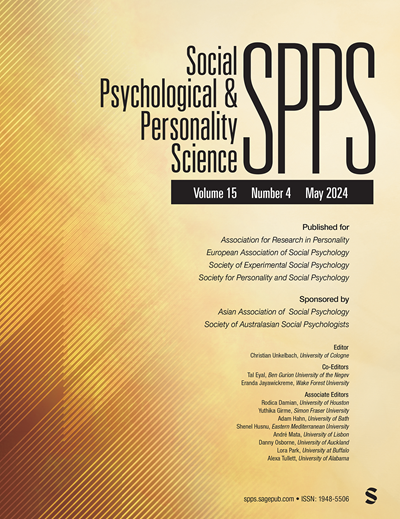不耐烦的时间
IF 3.3
2区 心理学
Q1 PSYCHOLOGY, SOCIAL
引用次数: 0
摘要
等待是无处不在的,但又是痛苦的。我们发现,等待的不适感会随着等待接近尾声而加剧。通过对真实世界事件的不耐烦程度进行测量的纵向研究,我们发现,在临近得知 2020 年美国总统大选结果(研究 1)、接种第一支 COVID-19 疫苗(研究 2)和登上公共汽车(研究 3)时,人们的不耐烦程度更高。后续实验发现,对结束的渴望是这种效应的基础,并且在控制了人们已经等待的时间后,不耐烦情绪在等待结束时会增加(补充研究 1-4)。这些研究结果表明,当等待即将结束时,等待的痛苦会加剧。本文章由计算机程序翻译,如有差异,请以英文原文为准。
Impatience Over Time
Waiting is ubiquitous yet painful. We find that the discomfort of waiting intensifies as the wait draws closer to its end. Using longitudinal studies that measured impatience for real-world events, we documented greater impatience closer to learning the results of the 2020 U.S. presidential election (Study 1), receiving the first COVID-19 vaccine (Study 2), and boarding a bus (Study 3). Follow-up experiments found that a desire for closure underlies this effect, and that impatience increases at the end of the wait controlling for how long people have already been waiting (Supplemental Studies 1–4). These findings suggest that the distress of waiting escalates when the wait is almost over.
求助全文
通过发布文献求助,成功后即可免费获取论文全文。
去求助
来源期刊

Social Psychological and Personality Science
PSYCHOLOGY, SOCIAL-
CiteScore
12.50
自引率
1.80%
发文量
77
期刊介绍:
Social Psychological and Personality Science (SPPS) is a distinctive journal in the fields of social and personality psychology that focuses on publishing brief empirical study reports, typically limited to 5000 words. The journal's mission is to disseminate research that significantly contributes to the advancement of social psychological and personality science. It welcomes submissions that introduce new theories, present empirical data, propose innovative methods, or offer a combination of these elements. SPPS also places a high value on replication studies, giving them serious consideration regardless of whether they confirm or challenge the original findings, with a particular emphasis on replications of studies initially published in SPPS. The journal is committed to a rapid review and publication process, ensuring that research can swiftly enter the scientific discourse and become an integral part of ongoing academic conversations.
 求助内容:
求助内容: 应助结果提醒方式:
应助结果提醒方式:


